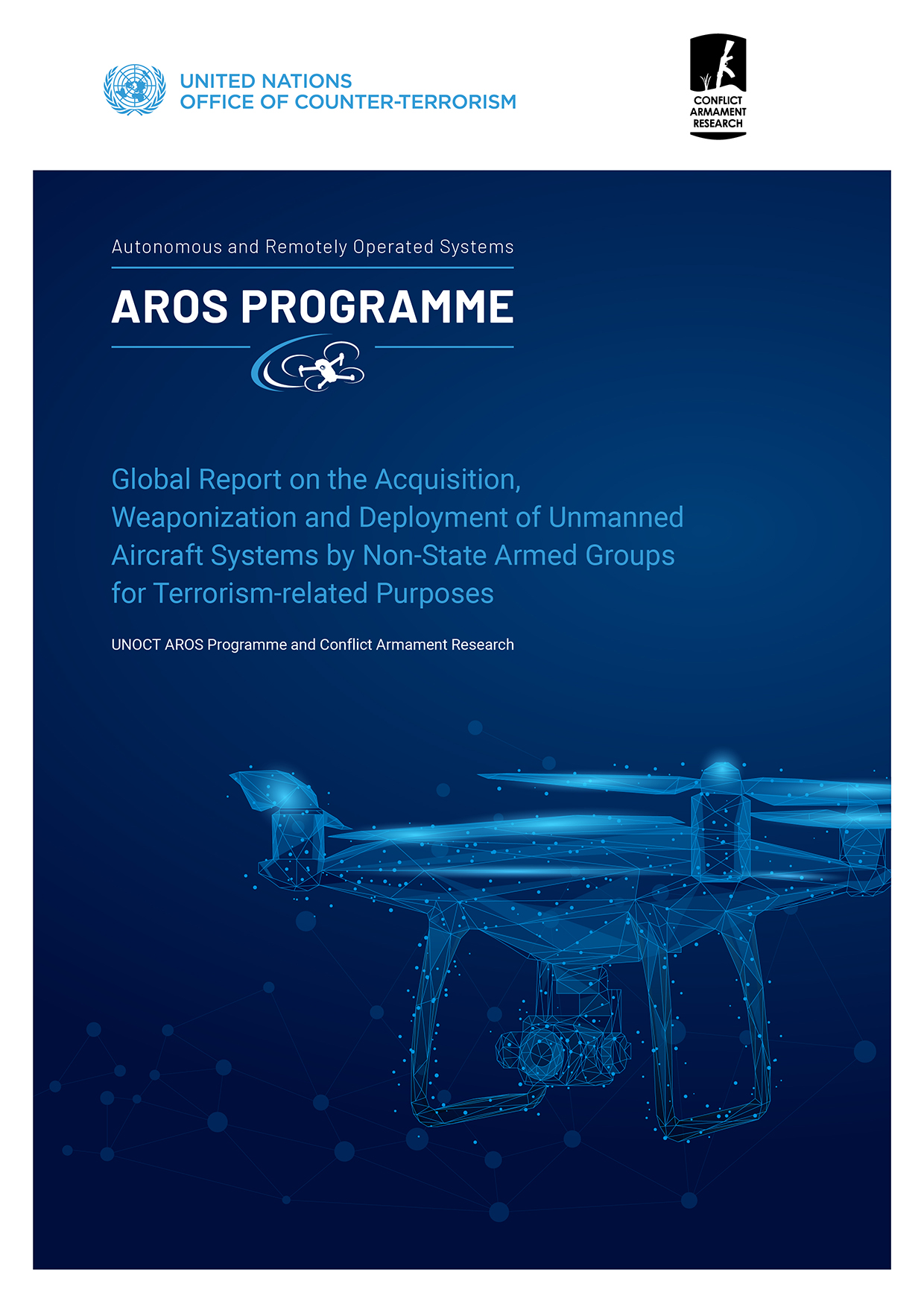- عربي
- 中文
- English
- Français
- Русский
- Español
Autonomous and Remotely Operated Systems

Global Counter-Terrorism Programme on Autonomous and Remotely Operated Systems (AROS)
- UN Office of Counter-Terrorism Deputy-Under-Secretary-General Raffi Gregorian's remarks during UNOCT CT Week 2021 side event on Commercial Unmanned Aircraft Systems in Counter-Terrorism Contexts, 29 June 2021.
Drones and other so-called Autonomous and Remotely Operated Systems (AROS) present a uniquely challenging terrorist threat. In the wrong hands, regular consumer drones can be used as lethal weapons, enabling terrorist to plan, coordinate and launch a vast range of deadly and potentially disruptive attacks against civilians, soft targets, and critical infrastructure. The number of nonstate actors already using aerial drones has steadily increased over the past several years. Through rapid advances in drone technology, AROS are slated to become a primary tactic of terrorist attacks in the future. At the same time, drones and other AROS have the potential to become tools in counter-terrorism efforts. The Global Counter-Terrorism Programme on Autonomous and Remotely Operated Systems (AROS Programme) was created in 2021 to support member states in addressing the threat posed by drones, UAS, and other AROS.
The AROS Programme provides innovative capacity-building assistance to requesting Member States in efforts to prevent and counter terrorism.
The programme supports the implementation of the United Nations Global Counter Terrorism Strategy (A/RES/60/288) and its 8th review wherein Member States have expressed concern over the potential misuse of new and emerging technologies, such as unmanned aircraft systems and the weaponization of commercial drones, and called upon all Member States to consider additional measures to counter the use of such technologies for terrorist purposes.
It also directly contributes to the implementation of key UN Security Council Resolutions 2309 (2016), 2341 (2017), 2370 (2017), 2396 (2017), to the Global Counter-Terrorism Forum (GCTF) 2019's Berlin Memorandum on Good Practices for Countering Terrorist Use of Unmanned Aerial Systems and its 2023 operationalization initiative; and furthers Sustainable Development Goals 9 and 16.
Programme Objectives
- Raise awareness on and promote the exchange of good practices and guidance related to autonomous and/or remotely operated systems (AROS)
- Enhance the capacity of Member States to counter terrorist threats related to AROS
- Enhance the capacity of Member States to use autonomous and/or remotely operated systems including unmanned aircraft systems (UAS), for non-lethal/non-kinetic human rights-compliant purposes; and to enhance the preparedness of Member States to mitigate AROS-related threats, including UAS
Through AROS programme objectives, the United Nations Office for Counter-Terrorism supports Member States in developing priority frameworks, such as the protection and promotion of human rights, international humanitarian law, and gender mainstreaming, but will work closely with all partners to ensure that the implementation of counter-terrorism measures does not prevent the legitimate use of AROS or hinder economic and industry developments related to emerging technologies.
Programme Approach
- Gathering experts and policy-makers to raise awareness on the benefits and threats associated with autonomous and/or remotely operated systems (AROS)
- Fostering partnerships between Member States, intergovernmental organizations, the private sector, and civil society
- Certified training courses for operators, analysts, and investigators
- Developing training products and guidance, including curricula, model SOPs, and guidance
- Producing and sharing analytical and research products to help guide the global conversation on AROS
- Providing equipment to support national capabilities to use and/or counter AROS
Partnerships and Funding
The AROS programme is led by the United Nations Office of Counter-Terrorism (UNOCT)’s Special Projects and Innovation Branch (SPIB) and is jointly implemented with the United Nations Counter-Terrorism Centre (UNCCT), which leads the programme’s efforts on digital forensics. The programme is also implemented in close cooperation with the International Civil Aviation Organization (ICAO), the Counter-Terrorism Committee’s (CTC) Executive Directorate (CTED), the United Nations Global Service Centre (UNGSC) under the United Nations Department of Operational Support (UNDOS), and the United Nations Department of Peace Operations (UNDPO) and Conflict Armament Research (CAR).
AROS is generously funded by the Federal Republic of Germany, the State of Qatar, and the United Arab Emirates.
In line with UNOCT’s commitment to a “whole of society” approach in countering the threat of terrorism and preventing and countering violent extremism conducive to terrorism, the AROS programme engages with Global Counter-Terrorism Compact entities, intergovernmental, national, and sub-national organizations, as well as stakeholders from the private sector and academia to bolster its awareness-raising and capacity-building capabilities.
For inquiries regarding cooperation and collaboration with the AROS programme, please contact us at: oct-aros@un.org
Recent Events
- Workshop on Vulnerable Targets Protection and Unmanned Aircraft Systems in Togo
- 2023 CT Week Side Event on Preventing and Countering Terrorist Use of Unmanned Aircraft Systems: Good Practices and Trends in the Acquisition, Weaponization, and Deployment of UAS, 21 June 2023
- Expert consultations on Global Challenges and Threats Associated with UAS, 25-27 January 2023
- Micro-UAS Operator Training Courses, May 2023 and Aug/Sep 2022
- Expert Roundtable on Counter-Terrorism and Unmanned Aircraft Systems (UAS) Digital Forensics, 23 March 2022
- Workshop on Counter-Terrorism and Unmanned Aircraft Systems (UAS) Digital Forensics, 20 May 2022



